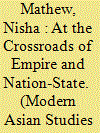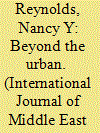| Srl | Item |
| 1 |
ID:
172865


|
|
|
|
|
| Summary/Abstract |
This article investigates gold smuggling in the twentieth-century western Indian Ocean. It illustrates how gold, condemned as a ‘barbarous relic’ by international monetary economists and central banks in the immediate post-war period, created an economy in the intermediate zone between a retreating empire and emerging nation-states in India and the Persian Gulf. Bombay and Dubai—connected by mercantile networks, trading dhows, migrants, and ‘smugglers’—were the principal constituencies and key drivers of this trans-regional economy. Partition and the concomitant flight of Indian mercantile capital into Dubai becomes the key to unlocking the many dimensions of smuggling, including its social organization and ethnic constitution. Looked at in such terms, gold smuggling reveals a transnational side to both partition and the post-colonial history of Bombay which has drawn little critical attention from historians. Consequently, it expands the analytic space necessary to explain how Dubai was able to capitalize on the arbitrage possibilities offered by import regulations in India, tap into the global networks of trade and finance, and chart its own course of development as a modern urban space throughout the latter half of the twentieth century.
|
|
|
|
|
|
|
|
|
|
|
|
|
|
|
|
| 2 |
ID:
131549


|
|
|
|
|
| Publication |
2014.
|
| Summary/Abstract |
Studies of public space focus disproportionately on cities. Complex and densely populated urban built environments-with their streets, plazas, institutional buildings, housing projects, markets-make concrete and visible attempts to manage difference. They also structure the ways that less powerful residents challenge and sometimes remake elites' spatial visions of the social order. The robust literature in Middle East studies on Islamic cities, colonial cities, dual cities, quarters and ethnicities, port cities, and so forth is no exception to this urban focus.
|
|
|
|
|
|
|
|
|
|
|
|
|
|
|
|